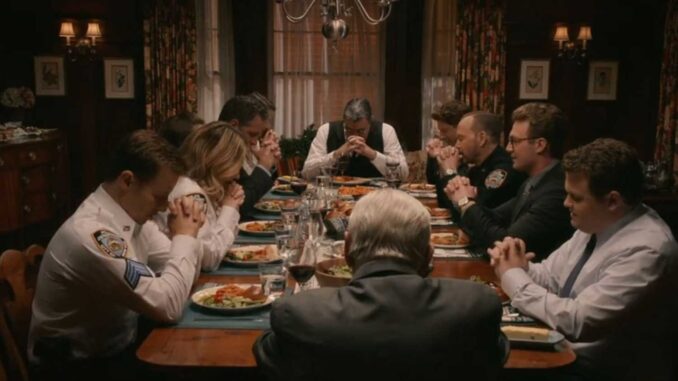
In the ever-competitive landscape of network television, few shows manage to climb the ratings charts as successfully as Blue Bloods. Consistently ranking as CBS’s 4th most-watched drama, the series has garnered a dedicated fanbase and critical acclaim over its impressive run. So, what led to CBS deciding not to renew Blue Bloods, despite its strong performance? This article delves into the multifaceted reasons behind the unexpected cancellation of a beloved series, exploring everything from network strategy shifts to behind-the-scenes dynamics. Join us as we uncover why high viewership alone wasn’t enough to secure Blue Bloods’ future on CBS.
Blue Bloods: A Phenomenon on Network TV
The Rise of Blue Bloods
Since its debut in 2010, Blue Bloods has established itself as a staple in CBS’s prime-time lineup. The show’s unique blend of family drama, law enforcement, and ethical dilemmas resonated with audiences, making it a go-to series for fans of procedural dramas. Led by Tom Selleck’s commanding performance as Police Commissioner Frank Reagan, the show brought together a stellar cast that added depth and authenticity to its narratives.
Consistent Viewership and Ratings
Blue Bloods consistently secured high ratings, often ranking among the top 10 most-watched dramas on network TV. Its ability to maintain strong viewership numbers season after season demonstrated its broad appeal and the loyalty of its audience. The show’s success was not just limited to the United States; it also enjoyed international acclaim, further solidifying its status as a television powerhouse.
Critical Acclaim and Awards

Beyond viewership, Blue Bloods received critical praise for its storytelling, character development, and performances. The show garnered multiple award nominations, highlighting its excellence in writing and acting. This critical recognition reinforced the show’s reputation as a quality drama, making its eventual cancellation all the more surprising.
The Decision to Cancel: CBS’s Strategic Shift
Changing Network Priorities
Television networks continually evolve their strategies to stay relevant and competitive. For CBS, this meant reassessing its programming slate to align with changing viewer preferences and market trends. Despite Blue Bloods’ strong performance, CBS decided to pivot towards newer formats and genres that they believed would capture a broader or different audience demographic.
Focus on Streaming and Digital Platforms
With the rise of streaming services like Netflix, Hulu, and Disney+, traditional networks like CBS are increasingly investing in their digital platforms. This shift in focus often leads to tough decisions regarding long-running shows. CBS might have chosen to allocate resources towards developing new content for its streaming service, Paramount+, rather than continuing to invest in an already established series like Blue Bloods.
High Production Costs
Maintaining a long-running series comes with significant financial commitments. As actors negotiate higher salaries and production values increase, the cost of producing each season escalates. CBS may have found that the production costs of Blue Bloods outweighed the benefits, especially when considering the potential return on investment compared to launching new series with lower costs.
Behind the Scenes: Internal Dynamics and Challenges
Actor Contract Negotiations
Prolonged negotiations over actor contracts can strain relationships and budgets. If key cast members, such as Tom Selleck, requested higher salaries to continue their roles, CBS might have decided that the increased financial burden was not sustainable in the long term.
Creative Direction and Burnout
After many seasons, creative teams often face burnout, leading to diminished storytelling quality. CBS might have observed that Blue Bloods was reaching a point of creative stagnation, with fewer fresh ideas and storylines to sustain its initial momentum. The network may have preferred to introduce new shows with innovative concepts rather than risk declining quality in a long-running series.
Scheduling Conflicts and Availability
Long-running shows sometimes face scheduling conflicts as cast members pursue other projects. If key actors were unavailable for future seasons, CBS might have opted not to renew the show to avoid disrupting its production schedule and narrative continuity.
Audience Engagement and Shifting Tastes
Changing Viewer Preferences
While Blue Bloods maintained high ratings, viewer preferences are not static. Audiences are increasingly drawn to more diverse and dynamic content that reflects contemporary issues and varied storytelling methods. CBS might have recognized the need to diversify its lineup to stay competitive, even if it meant discontinuing a successful series.
Competition from Other Networks and Streaming Services
The proliferation of high-quality content across multiple platforms has intensified competition. With viewers having countless options at their fingertips, retaining attention has become more challenging. CBS’s decision to cancel Blue Bloods could have been influenced by the need to free up slots for new, potentially more competitive shows that could better capture the audience’s shifting interests.
Social Media and Fan Engagement

Despite high viewership, Blue Bloods might not have leveraged social media and digital engagement as effectively as other shows. In today’s digital age, strong online presence and interactive fan engagement are crucial for a show’s longevity. CBS might have prioritized shows with more robust digital strategies over Blue Bloods.
Impact of the Cancellation on the Franchise and Fans
Fan Reactions and Community Response
The cancellation of Blue Bloods likely elicited strong reactions from its fanbase. Dedicated viewers expressed their disappointment and frustration on social media, fan forums, and other platforms. The community’s response highlighted the emotional investment and loyalty that Blue Bloods had cultivated over the years.
Legacy of Blue Bloods
Despite its cancellation, Blue Bloods leaves behind a significant legacy in the landscape of network television. Its portrayal of a multi-generational family in law enforcement provided a unique blend of personal drama and procedural action, setting a standard for similar shows that followed.
Potential for Revival or Spin-Offs
Television shows often have the potential for revival or spin-offs, especially if there is sustained fan interest and market demand. While CBS chose not to renew Blue Bloods, the show’s enduring popularity could pave the way for future projects within the franchise, whether on traditional TV or through streaming platforms.
Comparative Analysis: Similar Cases in Network TV
Other High-Rated Shows That Were Cancelled
Blue Bloods isn’t the only high-rated network TV show to face cancellation. Shows like The Mentalist and Chuck also ended despite strong viewership numbers. These cases illustrate that ratings alone are not always sufficient to guarantee a show’s continuation, especially when networks face strategic shifts or financial constraints.
Lessons Learned from These Cancellations

Analyzing why high-rated shows were cancelled can offer valuable insights. Factors such as high production costs, creative exhaustion, and shifts in network priorities frequently emerge as common reasons. For CBS, Blue Bloods serves as a case study in balancing consistent ratings with broader strategic goals.
The Role of Network Politics and Management Decisions
Behind-the-scenes politics and management decisions can heavily influence show renewals. Changes in network leadership or strategic direction can lead to abrupt cancellations, regardless of a show’s performance. Understanding the internal dynamics of CBS provides a fuller picture of why Blue Bloods was ultimately not renewed.
The Future of the Blue Bloods Franchise
Possibility of a Revival on Streaming Platforms
With the increasing dominance of streaming services, there is potential for Blue Bloods to find new life on platforms like Paramount+, Netflix, or Hulu. Streaming offers more flexibility in storytelling, budget allocation, and audience reach, making it an attractive option for reviving beloved series.
Spin-Off Opportunities and Expanded Universes
The rich character dynamics and expansive storytelling of Blue Bloods open avenues for spin-offs. Focusing on individual family members or introducing new characters within the same universe could keep the franchise alive and thriving, appealing to both old fans and new audiences.
Legacy and Continued Influence on Future Shows
Blue Bloods has set a benchmark for family-centric procedural dramas. Its influence is likely to be seen in future television series that aim to blend personal drama with professional action, creating compelling narratives that resonate with a broad audience.
Industry Perspectives: CBS’s Decision-Making Process
Insights from Network Executives
Network executives often face tough decisions balancing artistic integrity, financial sustainability, and strategic growth. Insights from industry insiders suggest that CBS’s decision to cancel Blue Bloods was influenced by a combination of factors beyond just viewership, including financial constraints and the desire to innovate.
Comparison with Industry Trends
The television industry is rapidly evolving, with a noticeable shift towards streaming and on-demand content. CBS’s move to cancel Blue Bloods aligns with broader industry trends where traditional networks prioritize digital platforms and new content that can compete in a crowded market.
Expert Opinions on the Cancellation
Television analysts and critics have weighed in on CBS’s decision, offering various perspectives. Some argue that the cancellation was short-sighted given the show’s consistent performance, while others believe it was a necessary step for CBS to adapt to changing market dynamics.
Fan Theories and Speculations
Unfinished Storylines and What Could Have Been
Fans speculate about how Blue Bloods would have continued to evolve if it had been renewed. Unfinished storylines, potential character developments, and unresolved conflicts fuel the imagination of the show’s most dedicated followers.
Potential for Reunions and Guest Appearances
There’s always a possibility for former cast members to return for special episodes or future spin-offs. Fan theories suggest that reunions could provide closure or open new chapters for the beloved characters.
Impact on CBS’s Programming Future
The cancellation of Blue Bloods might influence CBS’s future programming choices. It could lead to a reassessment of similar shows or inspire the creation of new series that blend family drama with procedural elements in innovative ways.
The Emotional Toll on Cast and Crew
Cast Reactions to the Cancellation
The actors and crew of Blue Bloods likely experienced a mix of emotions upon hearing the news of the cancellation. From sadness and disappointment to resilience and hope, the human side of television production is often overlooked but deeply impactful.
Career Implications for Key Members
For the cast, particularly the main stars, the end of Blue Bloods opens up new career opportunities. It allows them to pursue diverse roles and projects, expanding their portfolios and challenging their acting abilities in different ways.
Support Systems and Moving Forward
Moving forward after the cancellation involves professional and personal support systems. Cast members often lean on each other, industry networks, and personal resilience to navigate the transition and embrace new opportunities.
Conclusion
The cancellation of Blue Bloods by CBS, despite its standing as the network TV’s 4th most-watched drama, underscores the complex interplay of factors that influence network programming decisions. While high ratings and a dedicated fanbase are significant, they are not always sufficient to secure a show’s future when other strategic, financial, and creative considerations come into play. Blue Bloods’ legacy, however, remains intact, leaving an indelible mark on the landscape of network television and paving the way for potential future endeavors within its rich narrative universe. As CBS continues to evolve its programming strategy to adapt to the changing television landscape, the story of Blue Bloods serves as a poignant reminder of the delicate balance between audience demand and network ambition.
Frequently Asked Questions
1. Why did CBS cancel Blue Bloods despite its high ratings?
CBS canceled Blue Bloods due to a combination of strategic shifts towards streaming platforms, high production costs, and the desire to introduce new shows that align with evolving network priorities.
2. Was there any official statement from CBS regarding the cancellation?
Yes, CBS issued an official statement citing network strategy changes and resource allocation towards new and diverse content as reasons for not renewing Blue Bloods.
3. How have fans reacted to the cancellation of Blue Bloods?
Fans have expressed deep disappointment and frustration on social media and fan forums, with many calling for a revival or continuation of the series through streaming platforms or spin-offs.
4. Are there any plans to revive Blue Bloods on another platform?
As of now, there are no official plans to revive Blue Bloods. However, given its strong fanbase and enduring popularity, there remains potential for a revival on streaming services or through spin-off projects.
5. What will happen to the main cast of Blue Bloods after the cancellation?
The main cast members of Blue Bloods are likely to pursue new acting opportunities, both within television and film. The show’s legacy will also support their future projects, given their established popularity and critical acclaim.
